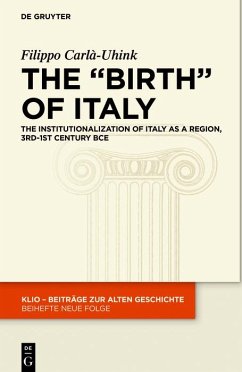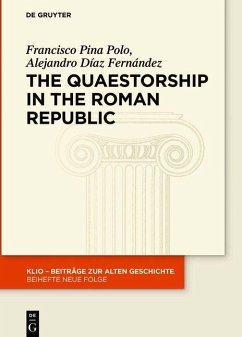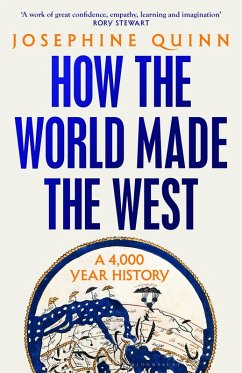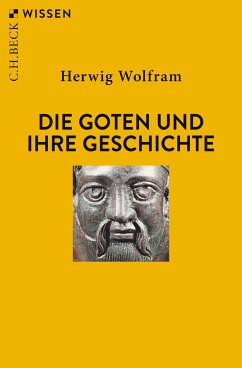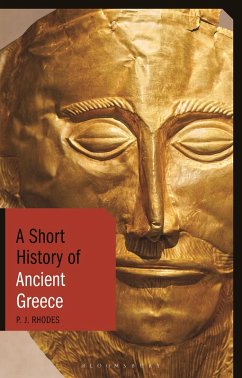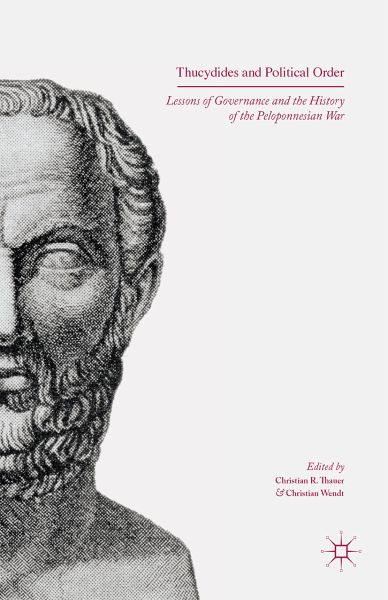
eBook, PDF
Thucydides and Political Order (eBook, PDF)
Lessons of Governance and the History of the Peloponnesian War
Redaktion: Thauer, Christian R.; Wendt, Christian

PAYBACK Punkte
20 °P sammeln!






This book, the second of two monographs, consists of contributions by world-class scholars on Thucydides' legacy to the political process. It also includes a careful examination of the usefulness and efficacy of the interdisciplinary approach to political order in the ancient world and proposes new paths for the future study.
Dieser Download kann aus rechtlichen Gründen nur mit Rechnungsadresse in A, B, BG, CY, CZ, D, DK, EW, E, FIN, F, GR, HR, H, IRL, I, LT, L, LR, M, NL, PL, P, R, S, SLO, SK ausgeliefert werden.
- Geräte: PC
- ohne Kopierschutz
- eBook Hilfe
- Größe: 1.38MB
- Text-to-Speech
- E-Mail des Verlags für Barrierefreiheitsfragen: accessibilitysupport@springernature.com
- Keine Einschränkung der Vorlesefunktionen, außer bei spezifischen Ausnahmen
- Keine oder unzureichende Informationen zur Barrierefreiheit
Christian R. Thauer is Senior Lecturer in International Relations and at the Center for German Studies at the Hebrew University of Jerusalem, Israel. He holds a PhD from the European University Institute in Florence, Italy. His thesis was awarded the International Studies Association International Political Economy (ISA-IPE) Best Dissertation Prize 2009/10. Before joining the Hebrew University, Thauer taught at the Freie Universität Berlin, Germany and was a Visiting Fellow at the University of Washington, Seattle, USA. Thauer is the co-editor of Business and Governance in South Africa and has published articles on political economy and governance. Christian Wendt is Professor of Ancient History at Freie Universität Berlin, Germany and head of the Berlin Thucydides Center. His publications include Sine fine (2008) and numerous articles on Greek historiography and political thought, ancient international law, and the reception of Thucydides in modern political theory. He is the co-editor of 2000 Jahre Varusschlacht (2012) and is currently co-editing a volume on ancient sea power.
Produktdetails
- Verlag: Palgrave Macmillan US
- Seitenzahl: 194
- Erscheinungstermin: 8. April 2016
- Englisch
- ISBN-13: 9781137527752
- Artikelnr.: 45064949
Review of Thauer/Wendt (edd.), Thucydides and Political Order
Oliver Schelske, Assistant Professor in Ancient History, University of Tübingen
This volume consists of various contributions to the reception (and therefore relevance) of Thucydides, arguing from different perspectives, i.e. different academic traditions (mainly political science and historiography). It is thus rather heterogeneous in terms of methodology and intended outcome(s). However, at the same time it represents a very promising attempt to advance studies of the Athenian historiographer, since the editors manage to (re-)assemble those scholars who are of great influence to the current discourse about possible (contemporary) readings of Thucydides.
Oliver Schelske, Assistant Professor in Ancient History, University of Tübingen
This volume consists of various contributions to the reception (and therefore relevance) of Thucydides, arguing from different perspectives, i.e. different academic traditions (mainly political science and historiography). It is thus rather heterogeneous in terms of methodology and intended outcome(s). However, at the same time it represents a very promising attempt to advance studies of the Athenian historiographer, since the editors manage to (re-)assemble those scholars who are of great influence to the current discourse about possible (contemporary) readings of Thucydides.
Mehr anzeigen
Furthermore, it is highly welcome that the volume in hand - like its predecessor edited by Ned Lebow and Barry Strauss in the early 90s ("Thucydides and the Nuclear War') - has its focus on an aspect of central prominence for contemporary discussions in the field of political science, historiography, and International Relations (IR) as well: that of political order (Intr., p.4f.). Since today international politics and forms of political (or constitutional) regime are developing rather heterogeneously, with former constellations of (international) political cooperation rearranging themselves anew (or developing their respective relationship), the aspect of political order is obviously of great impact not only in terms of practical (or political) relevance, but also concerning the study of Thucydides itself, combining it with contemporary general discussions about 'order' (e.g. in the field of ethnology or anthropology). Even if this is not mentioned explicitly, this could be one of the major (side-)effects of the volume in hand, since it seems to be relevant to non-historians and non-political scientists as well (being a 'common research agenda for future scholarly work on Thukcydides', cf. p. 5). Thus, scholarly as well as private interest of readers into the topic of this volume may well be expected.
Since the editors give a rather full account (and abstracts) of the various contributions to the volume in their introduction, it seems to be not necessary to reproduce such an account here. Besides a summary of contributions included in the volume, the introduction offers also something like a framework that holds the whole volume together. The editors (Thauer and Wendt) provide the reader with a sketch of scholarly work done in the field of studies on Thucydides (reviewing both political as well as historiographical works) by evaluating the results reached so far, addressing problematic developments, and specifying new perspectives (p. 2-4). According to the editors the aspect of political order will be some sort of a "new Thucydidean question' that ought to be of great impact onto any future study of Thucydides. Such an estimation is both charming and reasonable. What deserves to be highlighted here is also a certain trend in recent studies on Thucydides (which is obviously also felt as a kind of obligation) towards a new sensitivity for the complex character of an ancient text, which should not be read only partially (ab-)using it for own purposes (p.3). Needless to say in this context that is would be desirable for the Classics (with its specific tradition to regard literary conventions etc. as well) to play a greater role in future studies of the reception of Thucydides (cf. Thauer/Wendt, p. 3; Morley, p. 25.28).
The contribution of Neville Morley (which is one of the four chapters under review here) is especially useful, since it provides the reader with a very well written and clearly structured categorization of the vast bulk of former readings of and theoretical attempts to Thucydides. Its position within the volume as the first contribution after the introduction thus seems very helpful. Morley systematizes various approaches and methods in the respective fields of political science, historiography,
Since the editors give a rather full account (and abstracts) of the various contributions to the volume in their introduction, it seems to be not necessary to reproduce such an account here. Besides a summary of contributions included in the volume, the introduction offers also something like a framework that holds the whole volume together. The editors (Thauer and Wendt) provide the reader with a sketch of scholarly work done in the field of studies on Thucydides (reviewing both political as well as historiographical works) by evaluating the results reached so far, addressing problematic developments, and specifying new perspectives (p. 2-4). According to the editors the aspect of political order will be some sort of a "new Thucydidean question' that ought to be of great impact onto any future study of Thucydides. Such an estimation is both charming and reasonable. What deserves to be highlighted here is also a certain trend in recent studies on Thucydides (which is obviously also felt as a kind of obligation) towards a new sensitivity for the complex character of an ancient text, which should not be read only partially (ab-)using it for own purposes (p.3). Needless to say in this context that is would be desirable for the Classics (with its specific tradition to regard literary conventions etc. as well) to play a greater role in future studies of the reception of Thucydides (cf. Thauer/Wendt, p. 3; Morley, p. 25.28).
The contribution of Neville Morley (which is one of the four chapters under review here) is especially useful, since it provides the reader with a very well written and clearly structured categorization of the vast bulk of former readings of and theoretical attempts to Thucydides. Its position within the volume as the first contribution after the introduction thus seems very helpful. Morley systematizes various approaches and methods in the respective fields of political science, historiography,
Schließen
Für dieses Produkt wurde noch keine Bewertung abgegeben. Wir würden uns sehr freuen, wenn du die erste Bewertung schreibst!
Eine Bewertung schreiben
Eine Bewertung schreiben
Andere Kunden interessierten sich für


